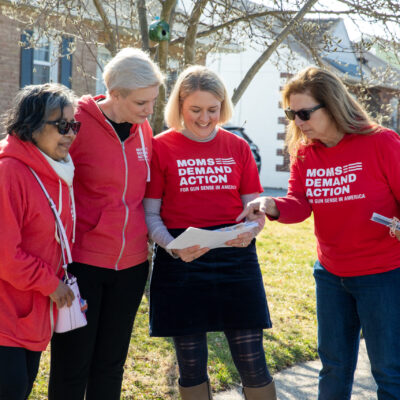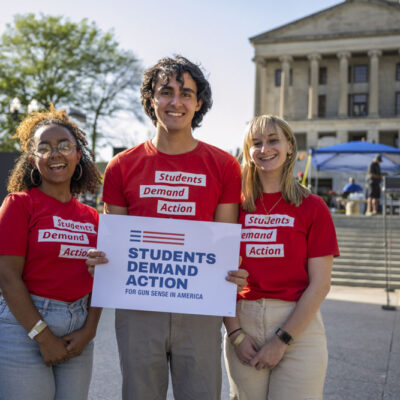Engagement in AANHPI Communities
AANHPI Heritage Month
May is Asian American, Native Hawaiian, and Pacific Islanders (AANHPI) Heritage Month—a time to discuss, uplift, and celebrate AANHPI communities. The term AANHPI refers to 75 countries plus Hawai’i. It is important to recognize that this number is disputed depending on what definition of “country” you use and whether certain regions, such as the Middle East, are included.
For Everytown, AANHPI Heritage Month is a time to celebrate the voices of AANHPI volunteers, gun violence survivors, advocates, and community members. This month and year-round, Everytown is committed to recognizing the increased gun violence that AANHPI people and communities are experiencing, while also calling out how gun violence and the gun industry as a whole affect AANHPI people across the country. Understanding these impacts allows for specific learning about what can be done to better support AANHPI communities in the U.S. in May, and every month year-round.
One urgent area of focus is the risk posed by unsecured firearms in homes and vehicles, which contributes to suicide, unintentional shootings, and theft. Throughout this month, we will center our efforts on raising awareness about secure firearm storage as a key and accessible violence prevention strategy. By uplifting AANHPI voices, educating communities, and supporting action on the ground, we strive to promote safe, informed, and empowered communities.
Social Graphics
Get Involved
AANHPI Moms Demand Action Caucus Group
Moms Demand Action Caucuses are spaces for volunteers who share an identity to meet, share perspectives, find resources, and work together to prevent gun violence. Groups will meet regularly and form specific project working groups based on member interest. They are led by fellow volunteers with the support of a staff facilitator.
Any Moms Demand Action volunteer can join a caucus that reflects their identity.
AANHPI Students Demand Action Affinity Group
Affinity groups are a space for Students Demand Action leaders and team members who share an identity to meet, build community, brainstorm initiatives, and work together. Each group also has its own Slack channel where members can share resources and have ongoing conversations.
Any Students Demand Action leader or team member can join an affinity group that they identify with.
AANHPI Stories
Read stories from AANHPI voices in the gun violence prevention movement.
“Not a Monolith”
AANHPI communities are not a monolith. They are diverse, with a range of cultural and linguistic subgroups. As a result, gun violence affects AANHPI communities in different ways.
Unfortunately, much of the research and national datasets fail to collect or disaggregate data by subgroups. Detailing differences amongst subgroups can help better address specific needs. For example, The Trevor Project conducted a survey in 2020 of young LGBTQ+ AANHPI people. Responses indicated a wide variation among subgroups reporting suicidal ideation. Hawaiian/Pacific Islanders reported the highest rates of suicidal ideation over the survey period. This was followed by Korean, Filipino, Indian, and Vietnamese youth, respectively. Chinese LGBTQ+ youth reported the lowest rates of suicidal ideation.
There is a need for engagement and research in culturally oriented gun violence prevention efforts. Both the research and resulting solutions must be inclusive of and linguistically accessible to all AANHPI subgroups. Gun violence impacts AANHPI communities in complex and wide-ranging ways, and there is a long way to go to bring it to an end. Everytown is committed to elevating gun safety advocates making changes in their communities and to holding space for survivors of gun violence.
Gun Violence in AANHPI Communities
More than 630 Asian American, Native Hawaiian, and Pacific Islander (AANHPI) people are killed by guns each year—nearly 2 people each day.1Everytown Research analysis of Centers for Disease Control and Prevention, National Center for Health Statistics. WONDER Online Database, Provisional Mortality Statistics, Multiple Cause of Death (accessed January 20, 2025). Average: 2019 to 2023. Asian/Native Hawaiian/Pacific Islander defined as non-Latinx origin. Since the start of the COVID-19 pandemic, violence against the AANHPI community has increased, especially against AANHPI women.
All hate-motivated acts of violence against AANHPI community members are tragic and horrific. In recent years, high-profile hate-motivated violence has garnered national attention. Incidents include:
- In March 2021, eight people—six of whom were Asian women—were shot and killed at spas in the Atlanta, Georgia, area.
- In January 2023, 11 people were shot and killed and nine others were wounded after a Lunar New Year Festival in Monterey Park, California.
- In January 2023, seven people were shot and killed in a mass shooting in Half Moon Bay, California.
AANHPI communities are not only affected by gun violence motivated by hate.
Rise in Suicide Affecting AANHPI Groups
Gun violence—in any form—against AANHPI communities demands recognition and solutions. Tragic mass shootings deserve attention when it comes to gun violence against AANHPI communities. It is equally important to know that the majority of gun deaths among U.S. AANHPI populations are by firearm suicide.2Centers for Disease Control and Prevention, National Center for Health Statistics. WONDER Online Database, Underlying Cause of Death. A yearly average was developed using four years of the most recent available data: 2018 to 2022. Asian/Pacific Islander defined as non-Latinx origin. Nearly 390 AANHPI people die by gun suicide each year. Young Asians and Pacific Islanders have the second-fastest growing firearm suicide rate of any racial or ethnic group.3Everytown Research analysis of Centers for Disease Control and Prevention, National Center for Health Statistics. WONDER Online Database, Provisional Mortality Statistics, Multiple Cause of Death (accessed January 20, 2025). Average: 2019 to 2023. Asian/Native Hawaiian/Pacific Islander defined as non-Latinx origin. Among veterans, AANHPI individuals have seen the highest increases in rate of suicide.
AANHPI Community Support for Gun Violence Prevention Measures
Gun violence has impacted AANHPI communities in a host of ways. In turn, communities have responded with support for gun violence prevention measures. A 2022 survey of AANHPI voters found that 73% of respondents ranked gun safety as an ‘extremely’ or ‘very’ important issue for deciding their vote. Additionally, 77% agreed that the country should have stricter gun safety laws.
Secure Storage—One Solution of Many
Support for gun violence prevention policy in AANHPI communities is clear. Research has identified specific solutions that can address the gun violence issues communities are facing.
Secure storage of firearms plays a pivotal role in reducing the risk of gun violence, particularly gun suicide. Millions of responsible gun owners follow recommended storage practices. However, an estimated 54 percent do not lock all of their guns, let alone store them unloaded, locked, and separate from ammunition. Researchers estimate that if half of households with children that contain at least one unlocked gun switched to locking all their guns, one-third of youth gun suicides and unintentional deaths could be prevented. This could save an estimated 251 lives in a single year.
Secure storage is just one of the array of solutions that can help prevent gun violence in AANHPI communities. Learn more about the evidence-based solutions that can reduce gun violence.











